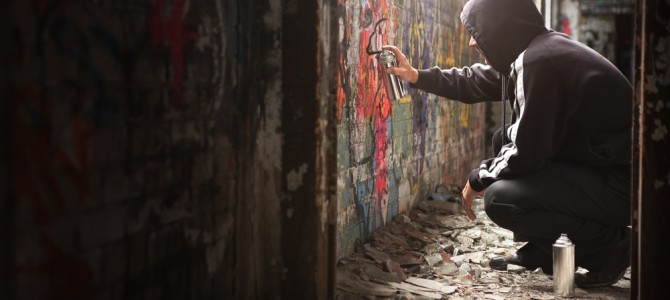
Conor Friedersdorf is upset with conservatives. Specifically, he’s infuriated by their blasé attitude towards police brutality. What will it take, he wonders, to persuade them that our justice system is unjust?
Friedersdorf raises some fair questions. Why, for example, are American citizens 100 times more likely to be shot by policemen than Brits? That seems like a very big number. How comfortable should we be with our high incarceration rates, particularly in light of reports of shoddy forensic science that may have put a non-trivial number of innocents behind bars? Paramilitary police raids (often conducted in the middle of the night, against suspects in non-violent crimes) can no longer reasonably be described as occasional “isolated incidents.” Should we really be okay with that?
Defending the Force
Conservatives are usually so eager to champion civil liberties against the whims of oppressive government. So what’s going on here? Why won’t they admit that America today has too many laws and not enough order?
Actually, there are some fairly good reasons for this sort of conservative reticence. Although I share Friedersdorf’s eagerness to see prudent reforms of our justice system, I always feel deeply conflicted when writing about police abuse, first and foremost because I’m painfully aware that cops do a tough and dangerous job that I probably couldn’t handle. Policemen put themselves on the line for the safety of people they don’t even know. (People like me, and my family.) They spend their lives elbow-deep in violence and vice, so that the rest of us won’t need to. It’s healthy to feel some reticence about taking (verbal) shots at them from the comfort of my front-room recliner.
Obviously, that’s not an adequate reason for shrugging at serious abuse. It’s critically important to maintain high standards for police officers, considering that we give them the power to use potentially-deadly force against American citizens in the streets of our own cities. A badge and gun come with serious responsibility, and dirty cops should be especially offensive to someone who appreciates the intrinsically honorable nature of that work.
But there’s another piece to this puzzle. If conservatives are unfazed by reports of aggressive policing, it’s probably because they suspect that such tactics are necessary. That, in their view, is mostly the fault of progressive liberals, whose political hubris and cultural carelessness have left us with an angry, dysfunctional, and lawless underclass.
Scapegoating the Police
Law enforcement is challenging by nature, but it’s especially hard when the police are expected to serve as a flood gate against the consequences of a million bad policy decisions. That insight largely explains the conservative reflex to sneer when liberals decry oppressive law enforcement. In the eyes of law-and-order conservatives, the police have effectively been tasked with containing the squalor created by decades of liberal folly. Nitpicking the way they go about this nasty job just seems like a bridge too far.
Perhaps the most stalwart defender of this type of view has been Heather Mac Donald. Over many years of commenting on this topic, Mac Donald has been particularly assiduous about arguing that apparent evidence of “racial bias” on the part of policemen really just reflects disparate levels of lawlessness. Young African-American males are indeed disproportionately likely to be stopped, arrested, shot, or killed by the police. That’s because the former are dramatically more likely to be engaged in criminal activity. According to Mac Donald, there’s good reason to think that the police are actually less likely to shoot or kill black suspects, if we adjust for disparate rates of criminality.
Whether or not this is generally true, one thing surely is: America’s cities are home to a deeply dysfunctional urban culture. This is not just the consequence of bad policing. Decades of infantilizing liberal policies have undermined family and community structures, leaving a hideous legacy of illegitimacy, addiction and criminality. Conservatives stick up for the police because they understand how dearly liberals would love to make law enforcement into their scapegoat. And that just isn’t reasonable. There’s no nice or happy way to deal with this level of social breakdown, and if you aren’t willing to discuss the deleterious effects of the welfare state and the sexual revolution, you’re in a poor position to criticize the police.
A Compromise: Let’s Blame Everybody
America’s urban neighborhoods are a mess, and that’s not all the fault of the police. But Friedersdorf’s criticisms might still be legitimate. Balko and others have documented some genuinely worrisome trends in police activity: increased militarization, decreased concern with the civil liberties of civilians, and a tendency to harass civilians over small-time offenses while large crimes go unsolved. We don’t have to decide whether to blame the police or failed social policies. We can criticize both.
Actually this makes perfect sense. Bad parents often combine over-indulgence with sporadic, ill-considered efforts at discipline. In a similar way, the infantilizing of America’s poor might be seen both in an imprudent welfare state and in the inconsistent, bullying tendencies of local law enforcement (encouraged by small-time bureaucrats who want the statistics to show that they are “doing something” about the unruly urban poor). Unsurprisingly, people react more negatively to the disciplinary measures than to the unearned benefits. But they might really be part of a single lamentable whole.
If that’s true, good conservatives should want to re-examine the whole system, including both the carrots (benefit programs) and the sticks (criminal justice). On the justice side, that probably means (among other things) reining in police unions, decriminalizing a number of trivial “offenses,” changing our incentive structures to promote the good kind of police work, and implementing sentencing reform.
Conservatives are right to want to protect the police from liberal scapegoating. But we can’t afford to leave law enforcement as the one branch of government that gets a free pass to operate however it sees fit. A true “law and order” conservative should demand good laws, and real order.









